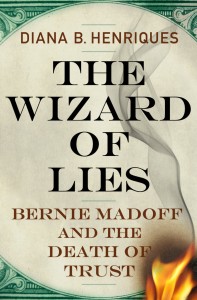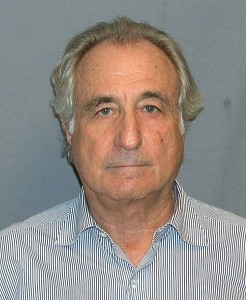The Inquisitor
Anatomy of a Confidence Man: A Well-Defended Mind
confidence trick – (n.) 1 Originally, a swindle in which a “mark” was convinced to entrust valuables to a swindler; 2 the act of fooling someone into believing something false. (synonyms: bunco, flim flam, hustle, con, grift, scam, bamboozle)
Image may be NSFW.
Clik here to view. By most measures, Bernie Madoff was the most successful Ponzi schemer in modern history. An esteemed veteran of Wall Street, he inspired confidence in colleagues…and in thousands of investors, who entrusted him with billions.
By most measures, Bernie Madoff was the most successful Ponzi schemer in modern history. An esteemed veteran of Wall Street, he inspired confidence in colleagues…and in thousands of investors, who entrusted him with billions.
One catch: He didn’t ultimately succeed. Ponzi schemers rarely do, says Diana B. Henriques, author of The Wizard of Lies: Bernie Madoff and the Death of Trust. The Ponzi fraudster constructs a tower on no foundation; and when the economic temblor inevitably occurs, the edifice tumbles.
Why, then, do Madoffs keep emerging?
“The first big lie a Ponzi schemer has to tell is to himself, that he will get away with it it somehow,” said Henriques in an interview with PursuitMag. “That ability to simply shut the door on inconvenient and uncomfortable truth is essential to being a con artist.”
Henriques, a NYTimes financial writer, was the first journalist to interview Madoff after his arrest. She met with him in person, she explains, to learn how a gifted confidence man operates, what he believes about the world, and how he deceives himself.
In her interview with Madoff, Henriques focused on Madoff’s psychology: Was he a sociopath? Did he show remorse? And above all, what mental gymnastics did he use to win people’s trust so completely?
What Henriques observed in Madoff was a trait she calls “a well-defended mind” — the ability to distance himself from guilt or responsibility, to evade the kind of anxiety most people feel when telling lies, and to ignore the truth of his crimes. It’s the mental magician’s dark discipline, a malevolent gift that led Madoff, his family, and those who trusted him to ruin.
Below, you’ll find excerpts from our interview with Henriques, and her insights into the mind of a brilliant con artist.
6 Traits of a Well-Defended Mind
1. The Gift of Spin
Madoff, in person, is very different from anything you had ever seen or read about schemes. He broke all the rules of the Ponzi schemer.
Bernie had made me feel very special. He had flattered me in a way that exactly touched my buttons. He knew exactly what would make me feel great. I realized that even though I knew that he was a fraud and a liar, his flattery of me felt good.
It was a blinding revelation: that even when you know someone’s a liar, when they are flattering you, they are drawing you in. A con artist is always spinning you, always.
2. The Ability to Ignore Inconvenient Realities
One of the things that most of us find baffling about Ponzi schemers is how do you wake up every morning with the weight of this crime bearing down on you? Imagine all your friends and relatives gathering around you at Thanksgiving, and you’re looking in their eyes, and you know you’re stealing from every one of them. How do you stand it?
I don’t think you can be a criminal without that capacity to defend yourself against the reality of what you’re doing.
That ability to simply shut the door on inconvenient and uncomfortable truth is essential to being a con artist.
There are only three exits from a Ponzi scheme: a one-way ticket to the Seychelles, a leap off a building, or a prison term. I remember asking (Madoff) in the interview, “Bernie, for heaven’s sakes, it was a Ponzi scheme. How did you think it was going to end?”
That produced one of the most remarkable answers — that New York would blow up in some way, and everyone would be dead, and he wouldn’t have to deal with the unravelling.
It was an interesting look into the power that Ponzi schemers have to delude themselves about what they’re doing. The first big lie a Ponzi schemer has to tell is to himself — that he will get away with it somehow, that he will be the one Ponzi schemer of modern history who will not wind up on one of those three paths to destruction.
3. Lack of Empathy
There are wonderful studies of sociopaths and psychopaths that conclude that they really do lack the empathy gene. They don’t feel the pain of hurting other people the way you or I would.
Whether Madoff is a psychopath or a sociopath, I will leave that to the experts. But it was fascinating to see him rebuild his defenses after his son’s suicide — one of the most devastating things that can ever happen to a parent. And it showed me how he had been able to survive 25 years of criminal behavior.
It was fascinating to see him work and fascinating also to reflect on how widespread that talent must be among really skillful con artists.
4. The Ability to Suppress Guilt Feelings
Image may be NSFW.
Clik here to view. Never was that ability tested more than when Madoff’s son Mark committed suicide. There’s no doubt that the grief and the guilt he felt over the suicide of his son was genuine, was profound, and very nearly destroyed him.
Never was that ability tested more than when Madoff’s son Mark committed suicide. There’s no doubt that the grief and the guilt he felt over the suicide of his son was genuine, was profound, and very nearly destroyed him.
But I have watched him repair that door and lock it shut again.
When I saw him in the prison visiting room in February, 2011, he was a wreck. I barely recognized him as the man I had seen six months earlier. He had lost weight. He was badly shaved. His uniform was no longer dapper and crisp; it was rumpled and ill-pressed and unbuttoned. He was a mess.
He insisted on taking the conversation as far away from his family as possible. He wanted to talk about how complicit they must have been, how they must have known what was going on and didn’t stop him or intervene. He wanted to talk about the victims and their complaints about how ill they were being treated by the trustees.
Numbers, dollars and cents, recovery percentages, all that factual, rational stuff — he clung to those topics, wouldn’t let them go, even when I tried to turn in a different direction.
He would not talk about his feelings about Mark. When I pressed him right at the end of the interview, the only thing he could say was in reference to a People Magazine article that had just come out. He said, “I was very sorry to see the picture that they used with that article.” That’s all he would say.
There's no doubt that the grief and the guilt he felt over the suicide of his son was genuine...But I have watched him repair that door and lock it shut again.
I bought the magazine. It was a picture of (his wife) Ruth and the boys when Mark was very young. That was as close as he got to saying, “That picture broke my heart.”
In subsequent emails, he acknowledged the guilt that he felt about Mark. But along the way, he was focusing on it as part of his anger at some of the family members — “Why did she say that?” and “That wasn’t how I remembered it.” Once he could transfer that grief unto some other platform, that’s when he mentioned the guilt and grief he felt about Mark’s death.
Meanwhile, his attitude toward his other victims was hardening and growing more bitter and less remorseful. That came to dominate his conversation. I could see him moving away from this horrific experience for which he had no answer. He had no defense.
5. Avoidance
All he wanted to talk about were things as far from Mark’s death as he could get — the Wilpon family fight, a guilty plea by one of his former employees. Looking back, I can kind of trace his journey away from the reality of his son’s suicide through those conversations that we had.
It’s curious that he does not specify things that he did, and that there was never a moment in which he said, “If only I had done this, if only I hadn’t done that…if only I had turned myself in before I told the boys about it, instead of putting them in the position of having to report me.”
There was never a moment in which he said, “...If only I hadn't done that."
He never went into that territory at all. But he did, in several notes, say that he holds himself completely responsible for Mark’s death. He says the words, but he doesn’t add the specifics of how he brought Mark’s death about.
I truly don’t doubt that he feels profound remorse and guilt over Mark’s death, but I also don’t doubt that he will go to his grave without ever having fully expressed or maybe even understood how he drove his son to suicide.
6. The Gift of Confidence
They don’t call them “con artists” for no reason. It is an artistry. I thought of it as his fatal gift — this magical ability to win people’s trust, to always claim the benefit of the doubt, to explain away any uncomfortable reality. The manner that he had of drawing people in with praise, with very deft flattery, with every appearance of personal interest and fascination. I see it as a curse.
These are the gifts of a sociopath. By many measures, Steve Jobs was a sociopath. If you read Walter Isaacson’s marvellous biography of him, you could say, “Wow. This was one weird dude.”
And yet, he put it to use in building this incredible company. Sociopathic talents probably populate more executive suites than we want to think about. But not every sociopath becomes a criminal.
Sociopathic talents probably populate more executive suites than we want to think about. But not every sociopath becomes a criminal.
There’s another element of the equation beyond just sociopathic, narcissistic gifts, and we will search forever for what it is. That’s the fascination of characters like this. Lots of people are able to charm the birds out of the trees and do not roast them alive. Lots of people are able to win love and admiration and respect, and do not betray everybody who gave it to them.
So there’s another piece to the puzzle that we are constantly searching for, but that’s what makes it so intriguing for investigators. Certainly, every con artist is a sociopath. But obviously, not every sociopath is a con artist.
We need to be able to figure out: Where is that border? Where is that step too far? What took that particular charming sociopath across the line into massive wholesale thievery on a global scale? I think that’s the enduring fascination of crimes like this and men like this.
Diana B. Henriques is a senior NYTimes financial writer and author of several books on the financial sector. She’s currently working on a book about Black Monday, 1987.
See Part One, Q&A: Diana Henriques — How to Interview Bernie Madoff
Coming soon: Part 3 of our Q&A with Diana Henriques, in which she explains why people trust, and how we fall prey to con artists again and again.
Further reading:
NYTimes Madoff coverage (Includes a timeline and archive of Henriques’ articles)
How Bernie Madoff Did It (NYTimes review of Wizard of Lies)
Examining Bernie Madoff, ‘The Wizard of Lies’ (Henriques’s interview on NPR’s Fresh Air)